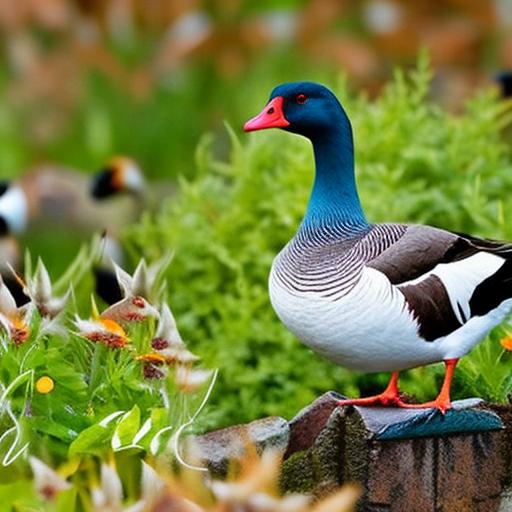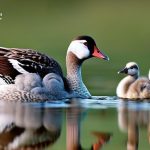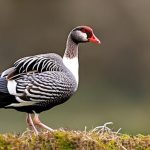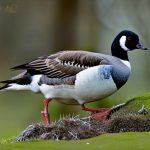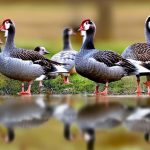Geese are beautiful creatures that can add a touch of nature to any garden. However, they can also cause a lot of problems if they decide to make your garden their home. From damaging plants to leaving behind droppings, geese can be a nuisance for gardeners. Fortunately, there are several methods that can be used to keep geese away and protect your garden.
One of the most effective ways to keep geese away is by understanding their behavior and what attracts them to certain areas. By identifying the reasons why geese are attracted to your garden, you can take steps to address these factors and make your garden less appealing to them. Additionally, physical barriers, decoys, repellents, sound and light devices, planting vegetation that geese dislike, removing sources of food and water, and encouraging natural predators can all be used to deter geese from your garden. If all else fails, seeking professional help may be necessary.
Key Takeaways
- Geese are social animals that prefer to stay in groups and are attracted to areas with open spaces and water sources.
- Geese are attracted to gardens because of the availability of food, water, and shelter.
- Physical barriers such as fences, netting, and hedges can be effective in keeping geese out of your garden.
- Decoys such as fake predators or other animals can be used to deter geese from entering your garden.
- Repellents such as sprays or granules can be applied to plants or surfaces to keep geese away.
Understanding the behavior of geese
To effectively keep geese away from your garden, it is important to understand their behavior and why they are attracted to certain areas. Geese are social animals that prefer open spaces near water sources. They are attracted to areas with short grass where they can easily spot predators and have a clear line of sight. Geese also prefer areas with easy access to food and water.
There are several types of geese, including Canada geese, snow geese, and white-fronted geese. Each type has its own habits and preferences when it comes to habitat selection. For example, Canada geese are known for their adaptability and can be found in a variety of habitats including urban areas, while snow geese prefer open fields and wetlands.
Identifying the reasons why geese are attracted to your garden
There are several factors that can attract geese to your garden. These include the presence of water, short grass, and a lack of predators. Geese are attracted to water sources such as ponds, lakes, and even swimming pools. They also prefer areas with short grass where they can easily spot predators and have a clear line of sight. Additionally, geese are more likely to be attracted to gardens that do not have natural predators such as dogs or scarecrows.
To identify the reasons why geese are attracted to your garden, you can observe their behavior and look for signs of their presence. Geese leave behind droppings that are easy to spot and can damage plants. They also create nests near water sources and may become aggressive if they feel threatened. By identifying these factors, you can take steps to address them and make your garden less appealing to geese.
Creating physical barriers to keep geese out
One of the most effective ways to keep geese out of your garden is by creating physical barriers. There are several types of physical barriers that can be used, including fences, netting, and hedges. Fences should be at least three feet high and have small openings to prevent geese from squeezing through. Netting can be used to cover plants or entire areas of the garden to prevent geese from accessing them. Hedges can also be used as a natural barrier to keep geese out.
When installing physical barriers, it is important to make sure they are secure and properly maintained. Check for any gaps or openings that geese could use to enter the garden. Additionally, regularly inspect the barriers for any damage and repair or replace them as needed.
Using decoys to deter geese
Decoys can be an effective way to scare geese away from your garden. There are several types of decoys that can be used, including predator decoys, motion-activated decoys, and reflective decoys. Predator decoys such as fake owls or coyotes can be placed in the garden to create the illusion of a predator presence. Motion-activated decoys can be set up to move or make noise when geese approach, scaring them away. Reflective decoys such as shiny objects or mirrors can also be used to deter geese.
To use decoys effectively, it is important to move them around regularly. Geese can become accustomed to the presence of decoys if they are not moved, so changing their location can help maintain their effectiveness. Additionally, make sure the decoys are visible and placed in areas where geese are likely to gather.
Applying repellents to keep geese away

Repellents can be used to keep geese away from your garden. There are several types of repellents that can be used, including chemical repellents and natural repellents. Chemical repellents typically contain ingredients that geese find unpleasant or irritating, such as methyl anthranilate. Natural repellents can include substances such as garlic or hot pepper spray.
When applying repellents, it is important to follow the instructions on the product label. Some repellents may need to be reapplied after rain or every few weeks to maintain their effectiveness. Additionally, make sure to apply the repellent evenly and cover all areas where geese are likely to gather.
Using sound and light to scare geese
Sound and light devices can be used to scare geese away from your garden. There are several types of devices that can be used, including noise makers, ultrasonic devices, and strobe lights. Noise makers such as air horns or whistles can be used to create loud sounds that scare geese away. Ultrasonic devices emit high-frequency sounds that are unpleasant for geese but not audible to humans. Strobe lights can create a flashing effect that disorients and scares geese.
When using sound and light devices, it is important to place them strategically in areas where geese are likely to gather. Additionally, make sure to vary the timing and intensity of the sounds and lights to prevent geese from becoming accustomed to them.
Planting vegetation that geese dislike
Planting vegetation that geese dislike can be an effective way to keep them away from your garden. There are several types of vegetation that geese find unappealing, including tall grasses, prickly plants, and plants with strong scents. Tall grasses can create a barrier that makes it difficult for geese to access the garden. Prickly plants such as holly or rose bushes can deter geese from landing or walking through certain areas. Plants with strong scents such as lavender or mint can also be effective in repelling geese.
When planting vegetation, it is important to consider the specific needs and preferences of geese. Choose plants that are native to your area and can thrive in your garden’s conditions. Additionally, regularly maintain the vegetation by pruning or trimming as needed.
Removing sources of food and water that attract geese
Geese are attracted to gardens that provide easy access to food and water. To keep geese away, it is important to remove these sources from your garden. This can include removing bird feeders or other sources of food that may attract geese. Additionally, make sure to cover or secure any water sources such as ponds or swimming pools to prevent geese from accessing them.
Regularly inspect your garden for any potential sources of food or water that may attract geese. Remove any fallen fruit or seeds that may be on the ground. Additionally, make sure to clean up any spilled birdseed or other food sources.
Encouraging natural predators of geese to visit your garden
One natural way to keep geese away from your garden is by encouraging their natural predators to visit. Geese have several natural predators, including dogs, foxes, and birds of prey. By creating a safe environment for these predators, you can deter geese from your garden.
To attract natural predators, consider planting vegetation that provides cover or nesting sites for them. Additionally, provide sources of food such as bird feeders or birdhouses that can attract birds of prey. If you have a dog, allow them to spend time in the garden to deter geese.
Seeking professional help to deal with persistent geese problems
If you have tried various methods and are still experiencing persistent geese problems, it may be necessary to seek professional help. There are several types of professionals that can assist with geese problems, including wildlife control experts and landscape designers. These professionals can assess your specific situation and recommend the most effective methods for keeping geese away from your garden.
When seeking professional help, it is important to communicate your concerns and expectations clearly. Ask for references or examples of previous work to ensure that the professional has experience dealing with geese problems. Additionally, make sure to discuss the cost and timeline for the services provided.
Keeping geese away from your garden can be a challenging task, but with the right methods and strategies, it is possible to protect your plants and maintain a beautiful garden. By understanding the behavior of geese and identifying the reasons why they are attracted to your garden, you can take steps to address these factors and make your garden less appealing to them. Whether it’s creating physical barriers, using decoys or repellents, employing sound and light devices, planting vegetation that geese dislike, removing sources of food and water, encouraging natural predators, or seeking professional help, there are several methods that can be used to keep geese away. It may take some trial and error to find what works best for your specific situation, but with persistence and patience, you can enjoy a goose-free garden.
If you’re looking for ways to protect your garden from geese, you might also be interested in learning about the benefits of having a garden chicken coop. Not only can chickens provide fresh eggs for your family, but they can also help keep pests like geese at bay. Check out this informative article on poultrywizard.com to discover how a garden chicken coop can be a practical and sustainable solution for both your gardening and poultry needs.
FAQs
What are some common methods for keeping geese out of a garden?
Some common methods for keeping geese out of a garden include using physical barriers such as fences or netting, using decoys or scare tactics, and planting certain types of vegetation that geese do not like.
What types of fences or netting are effective for keeping geese out of a garden?
Fences or netting that are at least 3-4 feet tall and have small openings (less than 2 inches) are effective for keeping geese out of a garden. Electric fences can also be effective, but should only be used by experienced individuals.
What are some effective scare tactics for keeping geese out of a garden?
Effective scare tactics for keeping geese out of a garden include using decoys such as fake predators or reflective tape, using noise makers such as air horns or banging pots and pans, and using motion-activated sprinklers.
What types of vegetation should I plant to keep geese out of my garden?
Geese do not like certain types of vegetation such as prickly or thorny plants, plants with strong odors, or plants with a bitter taste. Examples include holly bushes, lavender, and yarrow.
Are there any legal restrictions on how I can keep geese out of my garden?
Yes, there may be legal restrictions on how you can keep geese out of your garden depending on your location. It is important to check with your local wildlife agency or municipality to ensure that you are following all applicable laws and regulations.
Meet Walter, the feathered-friend fanatic of Florida! Nestled in the sunshine state, Walter struts through life with his feathered companions, clucking his way to happiness. With a coop that’s fancier than a five-star hotel, he’s the Don Juan of the chicken world. When he’s not teaching his hens to do the cha-cha, you’ll find him in a heated debate with his prized rooster, Sir Clucks-a-Lot. Walter’s poultry passion is no yolk; he’s the sunny-side-up guy you never knew you needed in your flock of friends!

